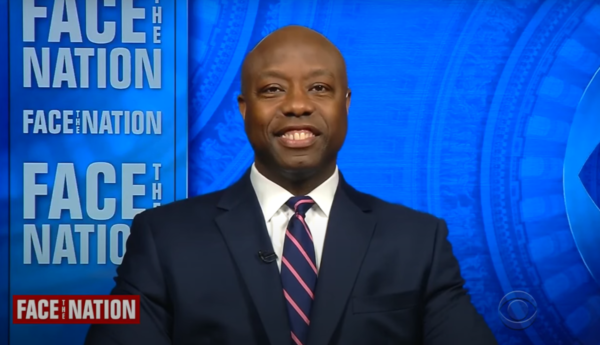South Carolina Sen. Tim Scott explained during a Sunday appearance on “Face the Nation,” why he believes he is uniquely qualified to lead the ongoing conversation among lawmakers about police reform.
Scott, the only Black GOP senator, is the sponsor of a 106-page police reform bill introduced in the Senate last June in the aftermath of the death of George Floyd. Democrats have contended that the bill, known as the Just and Unifying Solutions to Invigorate Communities Everywhere (JUSTICE) Act, which would not ban chokeholds or no-knock warrants, falls short.
The bill failed to reach the necessary margin of 60 votes for filibuster-proof passage in the Senate last year.
Last week, Scott made headlines after proposing a compromise on qualified immunity for police officers that would transfer responsibility from the individual officer to the department they’re employed by, and for declaring in response to President Joe Biden’s first address to Congress that “America is not a racist country.”
On Sunday, Scott doubled down on his stance on police reform on the CBS show and explained why he believes he’s the right person to lead the negotiations.

“One of the reasons I have asked to lead this police reform conversation on my side of the aisle is because I personally understand the pain of being stopped 18 times driving while Black,” Scott told host John Dickerson. “I have also seen the beauty of when officers go door to door with me on Christmas morning delivering presents to kids in the most underserved communities.”
Scott went on to say, “So, I think I bring an equilibrium to the conversation.”
Scott added that he was optimistic about the progress of the negotiations and that he thinks both parties are getting closer to reaching an agreement.
Democrats also proposed a police reform bill last June, known as the Justice in Policing Act. The bill deals largely with police accountability and seeks to weaken the qualified immunity doctrine which shields public officials, including police officers, from being held personally liable when someone claims their constitutional rights have been violated. The bill would also require the attorney general to create law enforcement accreditation standard recommendations and mandate that data on the racial distribution of drug charges, use of deadly force, and traffic stops be collected. In addition, the bill would create a federal registry for officers’ misconduct records and require that officers receive training of racial and religious incriminatory profiling.
The bill would ban chokeholds and only allow use of deadly force when necessary to prevent death of serious bodily injury, not just when deemed reasonable. Finally, the bill would limit the transfer of military-grade equipment to state and local law enforcement and increase the usage of body and dash cameras.
The Republicans’ bill would also put more body cameras on the street and mandate that it be reported to the FBI when an officer uses force or discharges their weapon. The bill would not ban the use of no-knock warrants but would mandate reporting on when, where, and why they were used. In terms of hiring, the bill would provide resources to help ensure police forces are reflective of the communities they serve, and make sure departments have access to candidates’ disciplinary record.
The House passed the Democrats’ bill in February, and the legislation is now in the hands of the Senate. In order for the bill to pass, 10 Republicans would have to vote to approve it, and so far, the bill has received zero Republican support in the House.
Scott said he’s hopeful both parties will reach an agreement to merge the two bills. “This time, my friends on the left aren’t looking for the issue,” he said. “They’re looking for a solution. And the things that I offered last year are more popular this year. That gives me reasons to be hopeful.”


